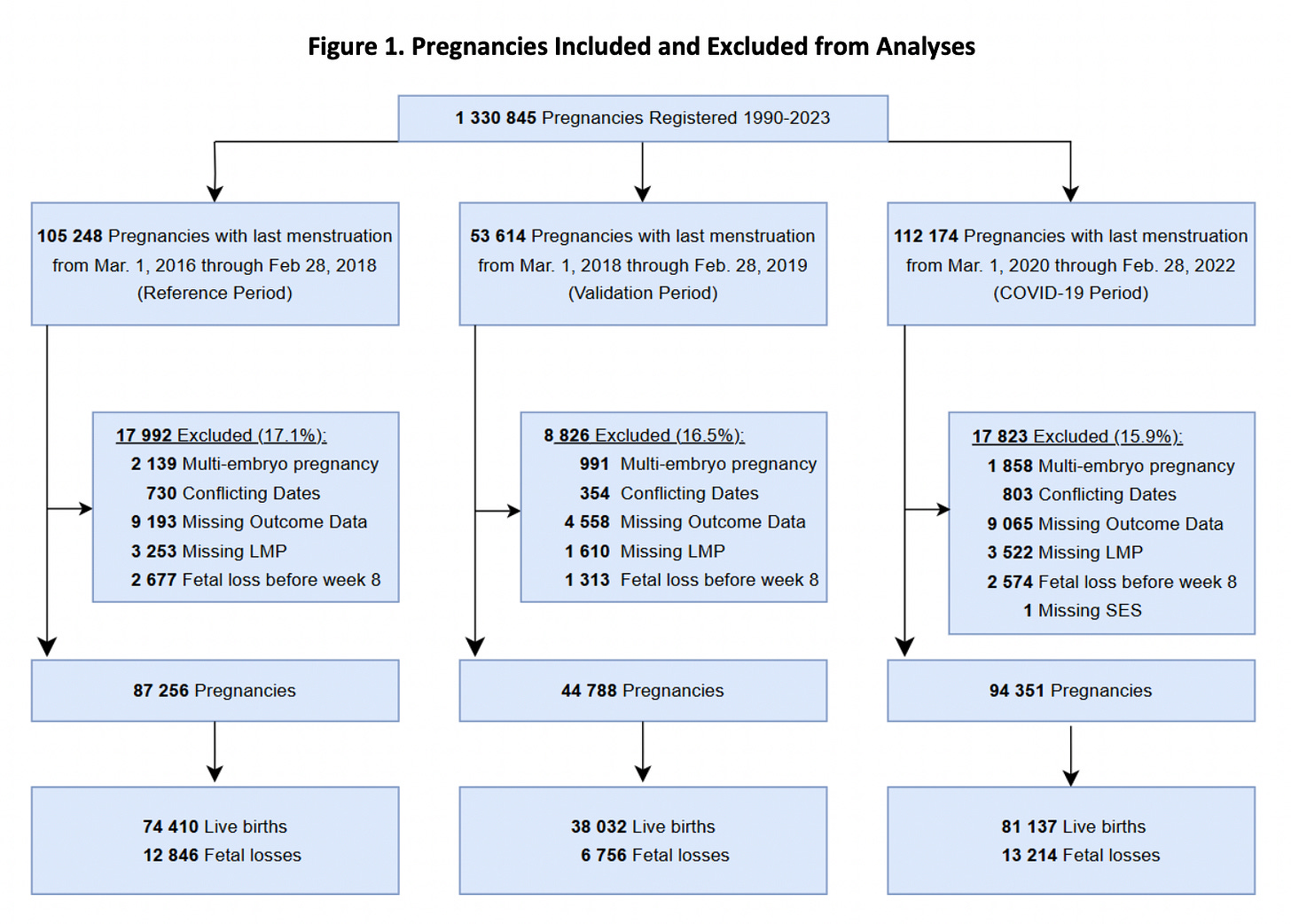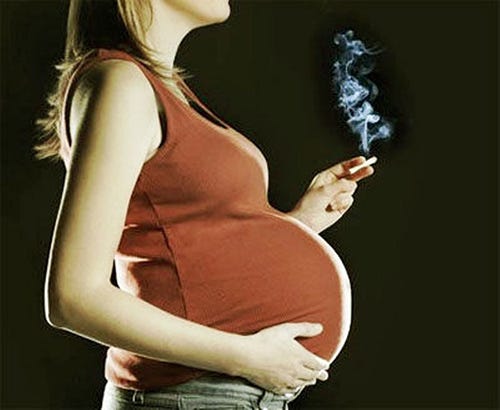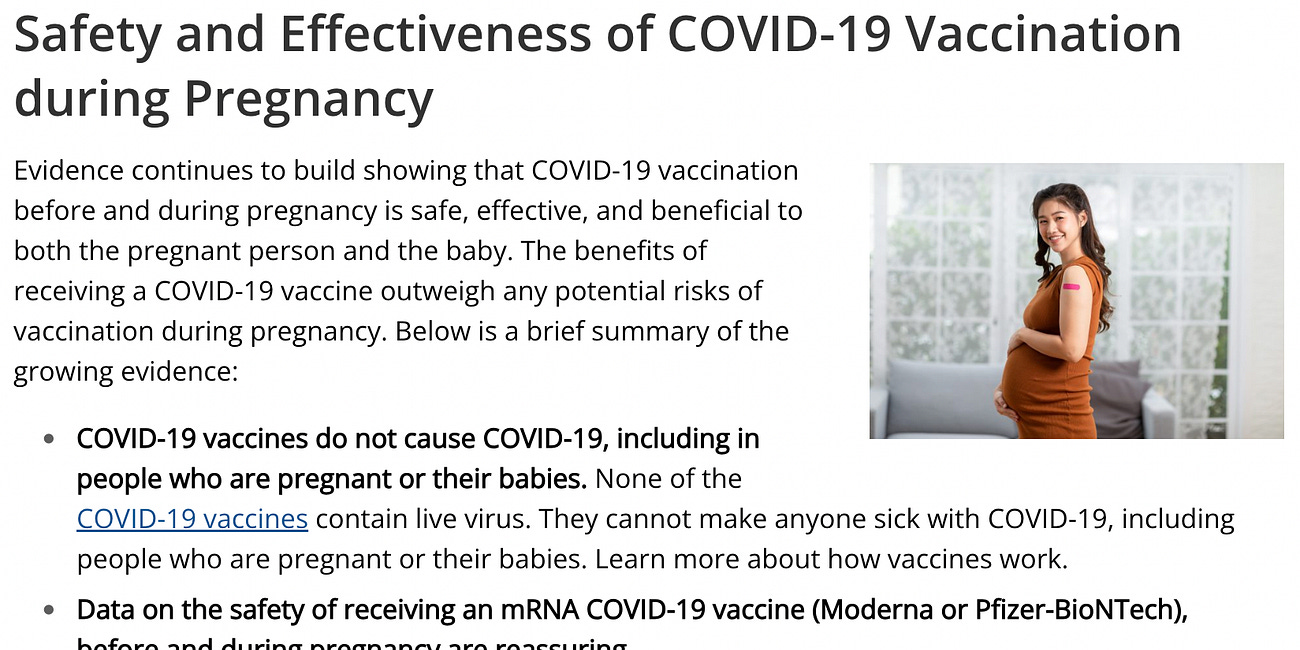Josh Guetzkow, Retsef Levi et al. hammer home risks of COVID-19 injections to pregnant women
Particularly in gestational weeks 8-13... color me shocked
A new preprint was uploaded on June 20, 2025 to the medRXiv preprint server entitled: “Observed-to-Expected Fetal Losses Following mRNA COVID-19 Vaccination in Early Pregnancy”.1 Among the authors are my friends and colleagues Josh Guetzkow and Retsef Levi - we have all been saying this for years.
The study investigates the association between mRNA COVID-19 injection (primarily Pfizer products) during early pregnancy and fetal loss rates in Israel. As if we don’t have enough to worry about. *It is important to remember that pregnant women were excluded from initial COVID-19 injection clinical trials.
The study addresses the limited safety data for injection in early pregnancy, particularly gestational weeks 8-13, when teratogenicity risks are highest.
As they point out in the preprint, existing observational studies face methodological challenges, such as healthy vaccinee bias, so the authors used an observed-to-expected fetal loss analysis. This means that they statistically-determined whether the number of fetal losses (including spontaneous abortions, induced abortions, and stillbirths) in a specific group - such as pregnant women injected with mRNA COVID-19 injectable products during early pregnancy - differed from what would be expected based on historical data.
They used data from Israeli Maccabi Healthcare Services (MHS), covering 226,395 pregnancies from 2016 to 2022 to assess whether injection (with Pfizer’s BNT162b2 injectable product) was linked to higher-than-expected fetal losses. It was.
They analyzed pregnancies in women where their last menstrual periods were between March 1, 2016, and February 28, 2022, using MHS’s electronic health record database, and compared observed fetal losses to expected losses in cohorts injected with COVID-19 injectable product doses 1 or 3 during the gestational weeks 8-13 and 14-27. Lo-and-behold, they actually had a control group that included women vaccinated for influenza during the same gestational periods or injected for COVID-19 or influenza before pregnancy. Expected fetal loss rates were derived from a logistic regression model trained on data spanning 2016-2018, adjusting for individual risk factors like maternal age, co-morbidities, and socioeconomic status. The analysis excluded pregnancies that occurred prior to week 8 due to inconsistent documentation, and focused on late fetal losses (after weeks 14, 20, and 25) to address potential biases from elective abortions.
What they found
It is provably clear: COVID-19 injection during gestational weeks 8-13 is associated with higher-than-expected fetal losses. Color me shocked. For dose 1, there were approximately 3.85 additional fetal losses per 100 pregnancies (95% CI: 2.55-5.14), and for dose 3, 1.90 additional losses (95% CI: 0.39-3.42), with most excess losses occurring after week 20. That is significant. In contrast, injection during weeks 14-27 showed lower-than-expected fetal losses. Influenza vaccination during weeks 8-27 consistently resulted in fewer fetal losses than expected, which is likely due to healthy vaccinee bias.
N.B. In case you don’t know, the healthy vaccinee bias is when healthier people get vaccinated, making vaccines seem safer in studies because these people already have better health outcomes.
Women injected in the context of COVID-19 or influenza before pregnancy had fetal loss rates at or below expected levels. Late fetal loss analysis confirmed persistent excess losses for COVID-19 injection in weeks 8-13, with 1.66 and 0.95 additional losses per 100 pregnancies for doses 1 and 3, respectively, by week 25.
They indeed conducted study robustness checks, including re-estimating the baseline model with data from 2016–2019 and adjusting the follow-up start to week 10, which yielded consistent results. Influenza vaccination cohorts from 2018-2019 also showed lower-than-expected fetal losses, supporting the model’s reliability. Comparisons of covariate distributions between COVID-19 and influenza vaccination cohorts revealed slight differences, which were adjusted for in the analysis. The study also examined SARS-CoV-2 infections, finding no significant increase in fetal losses, though unvaccinated women infected in weeks 8-13 had slightly higher-than-expected losses. This is explained by the notorious spike protein, in my opinion.
The authors concluded that mRNA COVID-19 injection during the gestational weeks 8-13 is associated with a significantly higher-than-expected number of fetal losses, particularly after week 20, highlighting safety concerns in early pregnancy. The lower-than-expected losses for influenza vaccination also highlight the influence of healthy vaccinee bias, which importantly, may mask risks in other studies.
The trolls will shout “preprint” of course, but this study is very hard to refute especially in the context of anomalously large signals in multiple pharmacovigilance databases world-wide. Anyone who does peer-review this study will not have many issues with the analysis as it is sound.
Additional reading:
31% of women who were exposed to COVID-19 products prior to pregnancy experienced a miscarriage according to VAERS domestic data
Update: Quote from an ob/gyn - “Just read your latest substack. Naert et al in 2020 showed the actual miscarriage rate in the first trimester is closer to 5-6 %. In 30 years that is even higher than what I have seen. The 13-15% they have always quoted as normal is elevated probably because of all of the shots they have us give our patients. Just an FYI.…
and this:
According to CDC, 'people' can get pregnant and should be injected with COVID shots
I have been digging a bit into the reports in VAERS of “Maternal exposure during pregnancy” and “Exposure during pregnancy” to see what the rates of miscarriage are when comparing the COVID shots to others. Along the way, when searching for information (according to the mighty and all-knowing CDC) about injection rates in pregnant women using the Brave …
and this:
"To Evaluate the Safety, Tolerability, and Immunogenicity of BNT162b2 Against COVID-19 in Healthy Pregnant Women 18 Years of Age and Older"
The Safety of BNT162b2 Against COVID-19 in Healthy Pregnant Women 18 Years of Age and Older, eh? Hmm. I was under the impression that if you are pregnant, or hoping to be, you shouldn’t do certain things like drink alcohol, smoke cigarettes, and get injected with experimental transfecting agents. You can find these updated clinical trial results
and this:
'Exposure' during pregnancy...
I decided to pull out all of the ‘exposure’ adverse event reports in VAERS. These reports include the MedDRA PT codes: ‘Accidental exposure to product’, ‘Maternal exposure during pregnancy’, ‘Exposure during pregnancy’, ‘Maternal exposure before pregnancy’ and ‘Exposure via skin contact’ as examples. It is important that I reiterate here that as part of…
Josh Guetzkow, Tal Patalon, Sivan Gazit, Tracy Beth Hoeg, Joseph Fraiman, Yaakov Segal, Retsef Levi. Observed-to-Expected Fetal Losses Following mRNA COVID-19 Vaccination in Early Pregnancy. medRxiv 2025.06.18.25329352; doi: https://doi.org/10.1101/2025.06.18.25329352









My question: why do healthy females who are either contemplating pregnancy or who are actually pregnant submit themselves and their developing foetus to Covid-19 vaccination? The frequency of Covid-19 infection in this age group (18-35 years) is low with transitory effects only. The lifetime effect on the newborn who was vaccinated in utero is yet to be determined. The risk vs benefit analysis does not favour vaccination.
Dr. Rose, THANK YOU for everything you have done to expose the inherent harm and true nature of the modified mRNA-LNP COVID shots.
Thank you to all the brave doctors & scientists and all the people of the world with curiosity, integrity, and strength of character who have risked so much to get this info out into the world.
The mRNA shots were/are always going to be an immunological catastrophe for humanity.
The mechanism of action (using mRNA instructions to turn one’s own cells into foreign non-self “spike protein factories”) is the primary mechanism of harm.
The primary danger of the COVID-19 mRNA injections has always been one’s own immune system’s attack response by the mighty CD8+ Cytotoxic T Lymphocyte cells (AKA Killer T-cells):
The COVID-19 mRNA injections must be recalled from the market and mRNA-based products must be banned because the modified mRNA-LNP genetic technology platform is fundamentally flawed & dangerous by design.
These modified mRNA-LNP COVID-19 injections, that trigger one's own immune system to attack & kill one's own formerly healthy cells (that have been instructed to produce/express foreign, non-self proteins), no matter where those cells are in the body, never should have been made available to the public in the first place.
When the (designed to be long-lasting) n1-methyl pseudouridine modified mRNA transfects one's cells, and gives instructions for the ribosomes to make & express foreign non-self proteins (such as the toxic SARS-CoV-2 spike protein), one's immune system sends the CD8+ cytotoxic T lymphocytes (CTLs) to kill those formerly healthy cells that are now making & expressing non-self proteins.
It is the mission of these CD8+ CTLs to seek out and destroy any such transfected cell that is making foreign non-self proteins. That’s what they do…
Due to the biodistribution properties of the lipid nanoparticles, the encased modified mRNA can go anywhere in the body, including crossing the blood-brain and placental barriers...The LNP "delivery vehicles" traveled to different parts of the body in different people.
Expressing any foreign protein is fatal to the cell doing the expressing. The reason is, our bodies are protected by being able to distinguish ourselves from things that shouldn't be there. Anything non-self will trigger immune destruction of the cells & tissues involved.
Some people will express lots of foreign proteins in vulnerable locations. Others express less in less vulnerable areas.
The location of expression defines the adverse event: if you get foreign protein expression in your heart cells, you could get myocarditis & experience cardiac arrest; if the expression is in your brain, spinal cord, or peripheral nervous system, you could get one or more of a variety of neurological conditions; if in your eye, possible blindness; if in your ovaries, possible infertility; if in the placenta, possible miscarriage, stillbirth, or birth defects; if in the endothelial cells that line your blood vessels, possible vascular &/or microvascular injuries like clots/microclots or the long white fibrous clots, leading to strokes, heart attacks, or pulmonary embolisms…
If the expression of foreign proteins is in your own immune cells, you could experience immune dysfunction, dysregulation, & suppression including repeated infections, immune tolerance of a pathogenic foreign protein due to antibody subclass switch to IgG4 & increased IgG4-related diseases, T cell exhaustion, interference with & suppression of innate immunity, persistent systemic inflammation, dysregulation of toll-like receptors and reduced cancer surveillance or the suppression of tumor-suppressing immune system activities & cell-signaling (increasing your risk of fast-growing and aggressive cancers)…
And more…
There's no limit to the horrible consequences of injecting into your body something that triggers your own immune system to attack & kill your own formerly healthy cells & tissues.
The public “health” agencies, the COVID “authorities”, & the “mainstream” media fraudulently marketed these experimental mRNA gene “therapy” products as “safe & effective vaccines”. Trusting people thought that they were being presented with the choice (or the mandate) as to whether or not to take a “safe & effective vaccine”…But that was/is a deceptively false “choice”…
The COVID-19 mRNA injections are NOT safe, they are NOT effective, and they are NOT vaccines.
These modified mRNA-LNP gene “therapy” injections never would have passed proper safety studies required for gene therapy products. Safety studies (including biodistribution, immunogenicity, immunotoxicity, genotoxicity, carcinogenicity, reproductive toxicity, shedding, long-term effects, & more) that were bypassed because of the fraudulent mislabeling as “vaccines”. (And because of the EUA & “countermeasure” designations under the Project BioShield Act & PREP Act).
NO ONE should have ever had the “choice” of taking these gene “therapy” injections because the modified mRNA-LNP genetic technology platform is fundamentally flawed & dangerous by design.
The danger is NOT limited to just getting more COVID “boosters”. ANY mRNA gene “therapy” product that transfects your cells and instructs those cells to produce foreign non-self proteins (ANY non-self protein) will trigger an immune system attack response against your own cells & tissues (the role of the Killer T-cells is to monitor ALL the cells of the body, ready to destroy/kill any that express foreign, non-self proteins). This makes EVERY mRNA-based injected product harmful by design.
No one who took these modified mRNA-LNP COVID injections made an informed decision. Most people had no clue about what they allowed to be injected into their bodies...
Also most people still do not understand that the devastating harms inflicted upon people over the last few years was intentional:
https://rumble.com/v6qcb0y-dr.-david-martin-mar-06-2025-edmonton-alberta-replay.html